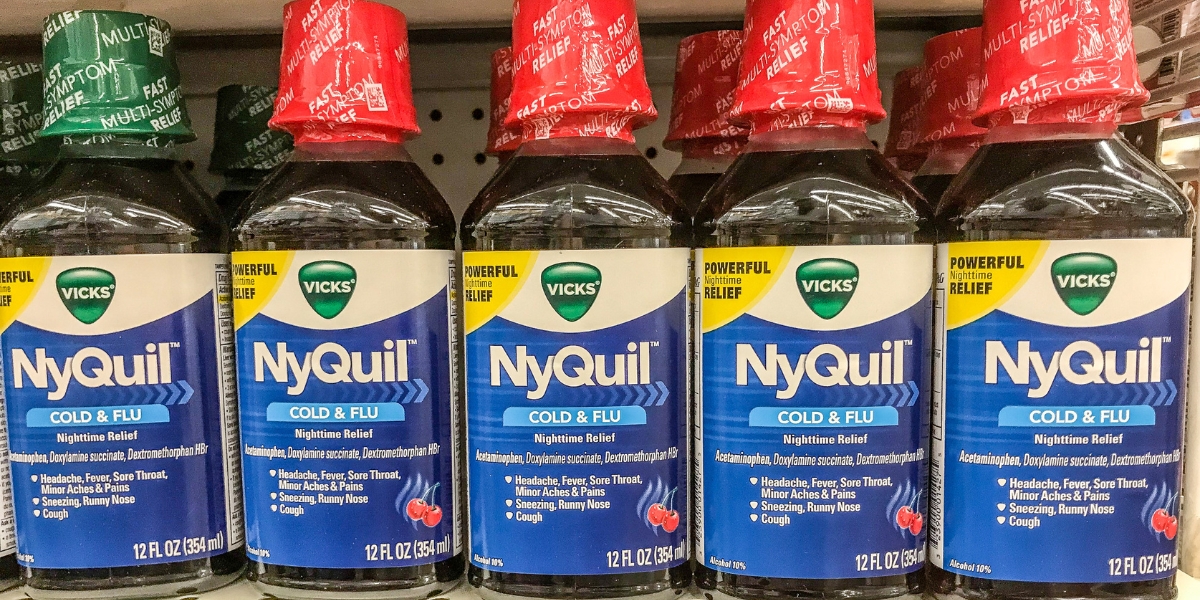Nyquil Addiction and Treatment

Understanding Nyquil Addiction
Many people take Nyquil and similar over-the-counter cough and common cold medications and never become addicted or experience harmful side effects, so how do some people develop an addiction to Nyquil?
Some people abuse Nyquil to help themselves fall asleep and soon find they cannot sleep through the night without it. Large doses of dextromethorphan (DXM), one of the active ingredients of Nyquil, cause it to act like a disassociative drug similar to PCP. Both types of abuse can quickly escalate into addiction and abuse.
Unlike other over-the-counter cold and flu medications, Nyquil and the other Triple C medications, another prevalent cough and cold medicine, don’t require ID to buy. Teenagers and people attempting to hide their drug addictions tend to abuse cough medicines like Nyquil because they are readily available and effective. The slang term for misusing Nyquil to get high is “robotripping.”
Signs of Nyquil abuse may not be easy to spot, but if you know what to look for, they may stick out more. Some signs of Nyquil abuse and addiction include:
- Constantly feeling tired
- Chronic stomach aches
- Buying and using a large amount of Nyquil
- Drastic changes in sleep patterns
- Inability to sleep without Nyquil
- Empty bottles of Nyquil in their room or trash
- Discolored lips, teeth, and tongue
- Seeing and hearing things that are not there
- Cravings for the medication
- Withdrawal symptoms
Many people also combine Nyquil with other drugs or drink alcohol to enhance its sedative effects. Combining drugs or alcohol is known as polysubstance abuse and often requires specialized addiction treatment programs and rehab facilities.

What Is Nyquil?
Nyquil is a common over-the-counter medication and cough suppressant manufactured by Vicks to treat symptoms of colds like a runny nose, sore throat, fevers, sneezing, and coughing, allowing the person to sleep through the night.
Nyquil comes in gel tablets but primarily in liquid form and different flavors. The original Nyquil formula contains 10% alcohol, although alcohol-free formulas are available.
Is Nyquil Addictive?
People who misuse Nyquil, intentionally or unintentionally, can develop addiction and dependence. However, when used short-term and according to the instructions, Nyquil is not addictive.
The National Institute on Drug Abuse (NIDA) explains, “DXM is an opioid without effects on pain reduction and does not act on opioid receptors. When taken in large doses, DXM causes a depressant effect and sometimes a hallucinogenic effect… Repeatedly seeking to experience that feeling can lead to addiction— a chronic, relapsing brain condition characterized by an inability to stop using a drug despite damaging consequences to a person’s life and health.”
Although NIDA refers to DXM as an opioid, it does not bind to the same receptors as addictive opioids like morphine or heroin. DXM uses its opioid properties to suppress the urge and muscle contractions that cause coughing without causing a high.
A tell-tale sign of Nyquil addiction is experiencing withdrawal symptoms when a person stops taking it. Although not everyone will experience withdrawal, people abusing Nyquil are more likely to suffer uncomfortable symptoms when they quit.
What Are the Ingredients in Nyquil?
Vicks lists three active ingredients in Nyquil: acetaminophen, dextromethorphan (DXM), and doxylamine.
Below is a brief description of what each ingredient does:
- Acetaminophen – a non-aspirin pain reliever and fever reducer
- Dextromethorphan – a cough suppressant that works to alter the signals between the brain and muscles that cause coughing
- Doxylamine – an antihistamine used to suppress allergies and cause drowsiness in sleep aids for people with insomnia
Large doses of DXM are responsible for causing mild stimulation and hallucination in people, while doxylamine causes delayed responses and drowsiness; the combination of the two is considered a recipe for the perfect robotrip.
Nyquil Side Effects
The side effects of Nyquil vary based on the amount taken, underlying co-occurring disorders, and if other drugs or alcohol are in the system.
People following the directions may experience mild side effects that disappear as the medication leaves the body. However, the mind-altering effects and side effects of abusing Nyquil are precisely why some people take large doses of Nyquil.
Common Nyquil side effects include:
- Drowsiness
- Stomach pains
- Falling asleep
- Lightheadedness
- Feeling mild stimulation
- Dry mouth, nose, or throat
- High blood pressure
- Increased or irregular heart rate
- Nausea
- Vomiting
- Sweating
- Itching
- Heavy feeling limbs
- Blurred vision
- Distorted hearing
- Hot and cold flashes
- Flushed skin
- Rash
- Loss of coordination
- Hallucinations
- Twitching and spasms
- Difficulting urinating
Because Nyquil contains acetaminophen, long-term abuse increases the likelihood of liver and kidney damage, especially when combined with other drugs and alcohol. Repeated use also increases the risk of seizures and heart attacks.
People on antidepressants should avoid taking Nyquil. Studies have shown that high amounts of DXM interact with these medications and can cause serotonin syndrome, a potentially fatal condition. Symptoms of serotonin syndrome include:
- Agitation
- Confusion
- Dilated pupils
- Extremely high heart rate
- Dangerously low blood pressure
- Fever
- Seizures
- Coma
- Death
The side effects of Nyquil and serotonin syndrome overlap considerably and can go unnoticed if someone falls asleep before they are apparent. Many people who “robotrip” or combine Nyquil with other drugs and alcohol die of an accidental overdose while they sleep, and help comes too late.

Nyquil Addiction Withdrawal
Nyquil withdrawal is not a well-studied area, but there are documented cases of people struggling with Nyquil addiction experiencing physical and mental symptoms when they quit.
For those who experience withdrawal, the length and severity of Nyquil withdrawal will vary based on the physical and mental health of the person, other substances they’ve been using, and how long they’ve abused the medication.
Symptoms of Nyquil withdrawal include:
- Strong cravings
- Nausea
- Vomiting
- Diarrhea
- Abdominal cramping
- Insomnia
- Raised blood pressure
- Mood swings
- Sweating
- Appetite changes
- Chills
- Tremor and twitching
- Anxiety
- Depression
Nyquil withdrawal can be uncomfortable and challenging physically and mentally. Residential treatment, or inpatient rehab centers, with 24-hour care and medical supervision, is often the best option for overcoming Nyquil withdrawal and DXM abuse.
Dextromethorphan Addiction Treatment
If you or a loved one is struggling with dextromethorphan addiction and drug abuse, Northridge Addiction Treatment Center can help you learn to live a happy life free from substance use.
Our comfortable, nurturing residential facility offers onsite medical detox with around-the-clock medical care and support to ensure your safety and comfort during withdrawal.
At NATC, we understand that overcoming addiction is about more than just quitting the substance itself. We aim to address the underlying causes of your addiction using an evidence-based treatment approach with various therapies to ensure our personalized treatment plans meet every resident’s unique needs, life circumstances, and recovery goals.
Reclaim your life today. Our compassionate treatment specialists are eager to discuss your path to meaningful, lasting recovery. Reach out today.
Find Meaningful Recovery
Our caring and compassionate specialists are eager to help you comfortably navigate this journey to recovery. Our individualized treatment plan, programs, and therapies may be a perfect match for you or your loved one. Let us assist you in living the happy life you deserve. It starts with a phone call.




